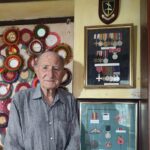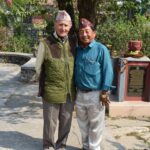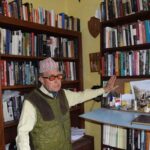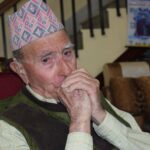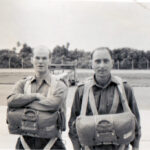John Cross was born June 21, 1925 in London, England. His father was a Great War veteran who had served with the Royal Horse Artillery and his mother was a gardener. He grew up in London against the backdrop of the Great Depression and emerging military tensions of the 1930s. John in fact recalls the key events of the period very well, from Edward VII to Chamberlain to Churchill. The unfolding of those events would lead him to volunteer when he was 17, a choice that allowed him to choose his regiment. He attended the Shrewsbury School near the Welsh border – so John did not feel the weight of the Blitz as it rained down on London. John asked to be allowed to sit his exams before heading off to his life in the military; he passed and in the summer of 1943 his army odyssey began. John and the men of the Oxfordshire and Buckinghamshire Light Infantry set out on a convoy through the Mediterranean and the Suez Canal en route to India and the CBI Theatre. John recalls arriving in Bombay (Mumbai) and being shocked by the scale of the poverty and the slums, but he and the other men were quickly dispatched to the Indian Military Academy in Dehradun. There they would be in training for many months, learning the basics of combat and jungle training. After John was assigned to the 1st Gorkha Rifles (often referred to as Gurkhas), and over time he grew to know these men well, leading them into combat against Japanese forces in Burma in the final months of the war. The Gorkhas had a stellar reputation as soldiers, and John attested to this based on his own wartime and postwar experiences. When the war ended he was in Othegon, not having had too much of a chance to make a personal impact on larger events. He decided to stay in the military, and his later career would make him the stuff of legend. Immediately following the war John was dispatched to Cochin China (present-day Vietnam), and it was his task to disarm the Japanese forces that had surrendered and to clear the way for the return of French colonial power. It was also a period where the Vietminh began to ramp up their fight to rid themselves of French rule, and at one John found himself in the unusual position of commanding Japanese troops against the Vietnamese insurgents. John was not pleased to be in a position of facilitating French reentry into the area, and he recalls many abuses that made him happy to get out. He returned to India in 1946, where he witnessed the 1947 Partition firsthand. It was a chaotic time, and it was followed in short order by a posting in Brunei, where another local uprising had begun. John’s experiences in these locales were varied, ranging from confrontations with an Iban headhunter to a session with a traditional Malay healer. Next on John’s impressive resume came a stint at the Jungle Warfare Training School in Malay, where he served as commanding officer as the 1960s drew to a close. In this capacity John observed the growing American war in Vietnam, and when he was named British defence attache in Laos in the 1970s he continued to watch those developments, along with the larger Cold War. John retired in 1982: he was very successful as a diplomat and military man, leading to his investiture with the Order of the British Empire by Queen Elizabeth II. John ended up settling in Nepal in 1982, choosing to make it his new home. It was a difficult process to become a citizen, but he succeeded and has made the country his home for many decades now, living alongside his surrogate family. Crestwood students were fortunate to zoom with John at his home in Nepal at various times in September-October 2024.
Videos
Click next video below to keep watching
- 1. Family and Early Memories
- 2. The War; Joining Up and Going Overseas
- 3. Arriving in India; The Gurkhas
- 4. Combat; Fighting against the Japanese
- 5. The End of the War; Staying in the Military
- 6. Cochin China
- 7. India - Partition
- 8. The Brunei Revolt
- 9. The Healer; Jungle Warfare
- 10. Laos
- 11. The Order of the British Empire
- 12. Nepal; Concluding Thoughts













